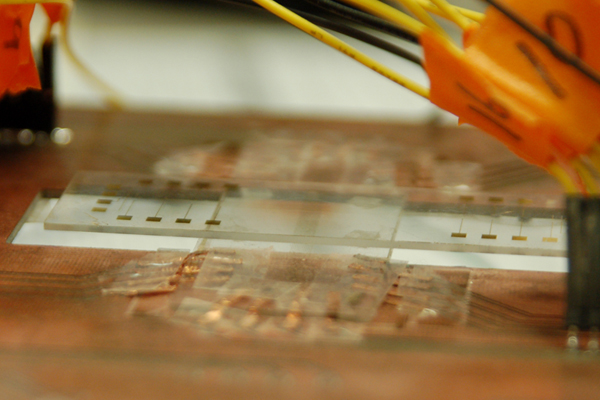By Thane Himes

ECpE professor Liang Dong’s latest research recently was featured on the back cover of the journal, Lab on a Chip.
Dong’s research project, which is a collaboration with Richard Martin, Professor, of Veterinary Medicine at Iowa State, focuses on a high-throughput, low-cost way to monitor the movement of microscopic nematodes using a micro-electro-fluidic approach, as opposed to using an optical microscope and a video camera. The project is supported by the National Science Foundation, National Institutes of Health, and the McGee-Wagner Research Fund.
“This is a chip-scale platform technology that provides a structurally simple, cost-effective, portable nematode tracking device,” Dong says. “A traditional optical microscope is costly, large, and hard to carry around for field applications. Often, the number of nematodes simultaneously monitored is limited by the field of view of the microscope. Our micro-electro-fluidic approach can overcome these issues.”
The primary element of the device is a set of microelectrode grids that are formed by orthogonally arranging two arrays of microelectrode lines. The arrays are spaced by a microfluidic chamber, which the nematode moves inside of.
“As a nematode moves inside the grids, its body may appear in several intersecting regions of the microelectrodes,” Dong said.
Using the data gathered from the changes in electrical resistance, the physical pattern of the swimming nematode can be fully measured.
“No microscope or camera is needed,” Dong said.
Dong believes his technology can benefit whole-organism bioassays in this regard. Typical applications of this data include screening drugs and chemical stress of nematodes by analyzing their movement patterns. The greater the movement of a nematode, the more resistant it will be to the drugs. Of the known nematode species, up to 33% are parasitic, causing diseases in plants, animals, and people. Parasitic nematodes are a particular problem in agriculture.
“Drug resistance has become a major concern in infecting nematodes,” Dong said. “We believe this platform technology can contribute to speeding up the process of screening for drug resistance of parasites, for limiting spread of parasites, and discovering new drugs.”
Lab on a Chip is a journal that focuses on work like Dong’s: the miniaturization at the micro and/or nano scale, across disciplines like biology, chemistry, bioengineering, physics, and more. The journal releases 24 issues per year.
